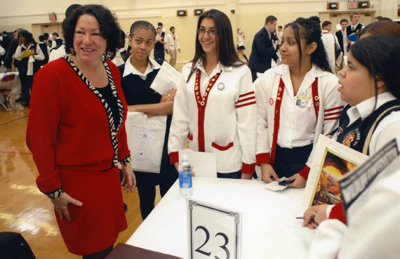
(RNS5-MAY27) Supreme Court nominee Judge Sonia Sotomayor visits students at her alma mater, Cardinal Spellman High School, in New York. For use with RNS-SCOTUS-PICK, transmitted May 26, 2009. Religion News Service photo courtesy White House.
WASHINGTON — For the Rev. Samuel Rodriguez, Tuesday’s (May 26) announcement of the first Latina nominee to the nation’s highest court was cause for equal parts celebration and caution.
“I’m caught between the proverbial rock and a hard place,” said Rodriguez, president of the National Hispanic Christian Leadership Conference.
“As a Puerto Rican American, as a Latino, I do commend President Obama for making a very practical strategic, political nomination. … As a Christian leader, which I am first and foremost, I have concerns.”
With Obama’s nomination of Sonia Sotomayor, a judge in the 2nd U.S. Circuit Court of Appeals, conservatives and liberals are lining up on their predictable sides of either criticism or support. But for Hispanic Christians, especially some evangelicals, the choice may be a mixed blessing.
While liberals are hopeful that Sotomayor would support their positions on matters such as gay marriage, conservatives worry that she may reflect “judicial activism” and the creation of policy, rather than interpretation of laws, from the high court.
As leading conservative Christian groups label Sotomayor a liberal, Rodriguez said he has to research her history before his group can make its own verdict about her.
“What does that mean for religious liberty?” he wonders. “What does that mean for the child in the womb? What does that mean for traditional marriage? What does that mean for limited government?”
The Rev. Daniel Delgado, pastor of Third Day Missions Church on Staten Island, N.Y., shares Rodriguez’s concerns.
“I know Latinos are very excited,” said Delgado, the New York/New Jersey director of Rodriguez’s organization. “But I’d just like to hear some more about her and her positions.”
While some Hispanic clergy are sitting on the fence for now about Obama’s pick, others are forging ahead with support.
“I am very hopeful that some of the issues that affect the Hispanic community directly or indirectly can be addressed … a lot more than in the present,” said the Rev. Jesse Miranda, who runs a leadership institute at Vanguard University, an evangelical school in Southern California.
While he is aware of the conflicts felt by leaders such as Rodriguez, Miranda said “nothing is perfect” and he expects Hispanic Christians will support a judicial nominee who reflects their ethnic and cultural heritage.
In her brief remarks after Obama announced her nomination, Sotomayor described her modest upbringing in a public housing project in the Bronx, her studies at Princeton and Yale, and work in private and public legal sectors.
“I hope that as the Senate and the American people learn more about me they will see that I am an ordinary person who has been blessed with extraordinary opportunities and experiences,” said Sotomayor.
The White House said Sotomayor was raised Catholic and continues to attend Catholic churches for important events, including family celebrations. If confirmed, she would be the sixth Catholic on the nine-member court.
The Rev. Miguel Rivera, chairman of the National Coalition of Latino Clergy & Christian Leaders, said his organization has sent a letter asking Republicans involved in the confirmation process to strenuously question her positions.
“We support strong, conservative, non-activist judges for the Supreme Court,” he said of his conservative evangelical group. “We’re commending the choice, but we’re not totally behind her until we evaluate her experience.”
Some evangelicals, meanwhile, are expressing no reservations at all.
“It’s totally amazing,” said the Rev. Marcos Miranda, pastor of Action in Christ International Church in Brooklyn, N.Y. “I think it’s great. I think she’s brilliant.”
Marcos Miranda, who said he is unusual as an evangelical who supports abortion rights, said he doesn’t consider Sotomayor to be an extreme choice.
“I think that her being where she’s at, where she’s not far left but she’s also not far right, is exactly where this country needs to go,” he said.
Some conservative organizations, while generally criticizing the choice of Sotomayor, noted that she wrote an opinion that upheld a ban that prohibited federal funding of overseas abortion, a policy that Obama has since overturned.
The Rev. Daniel de Leon, pastor of Templo Calvario, a megachurch in Santa Ana, Calif., said he would welcome Sotomayor as the first Hispanic on the bench.
“I think it’s long overdue,” he said. “We’re the largest minority in this country and I think we have a lot to contribute. I hope and pray that she will not only be nominated but accepted and passed.”
But de Leon, who noted that Hispanics — both Catholic and Protestant — tend to be conservative, expressed concern about how much her choice may reflect future nominees to the court.
“If this is an indicator of what Obama is going to be doing,” he said, “it’s going to take off to a real liberal left.”




